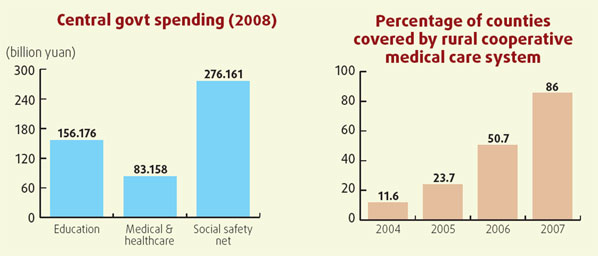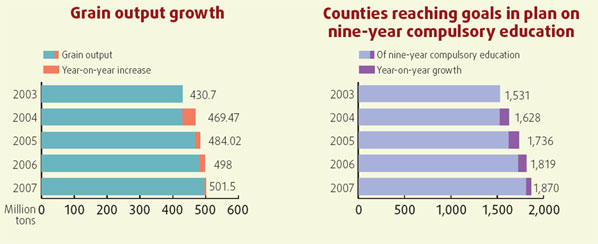"The aged are cared for until death; adults are employed in jobs that make full use of their abilities, and children are nourished, educated and fostered. Widows and widowers, orphans and the old without children, the disabled and the diseased, are all well taken care of."
So goes the ideal world described by ancient Chinese philosopher Confucius in his Ideal of a Commonwealth State.



Now, 2,000 years later, the premier of the world's most populous country has devoted almost half of his two-and-a-half hour work report on every sector mentioned in the classic tract, toward a shared goal of realizing such a people-first society.
As part of a nine-chapter plan for the goal, the premier said in his report to the first session of the 11th NPC that:
The government plans to earmark 6.8 billion yuan ($956.6 million) in its 2008 budget to build low-rent houses for the urban poor.
The amount is 1.7 billion yuan, or 33 percent, more than last year, Wen said, urging local governments to also increase funding in the sector.
Wen also called for more low-priced and small-scale houses for those in the middle-income bracket, as part of an integrated effort to solve housing problems caused by soaring property prices in a red-hot economy.
Governments at all levels are required to provide steady and adequate food supply to the country's 1.3 billion population, in an effort to control inflation, especially rising food prices, and maintain social stability.
"We will continue to implement the system of having provincial governors assume responsibility for the "rice bag" (grain supply) program and city mayors being responsible for the "vegetable basket" (non-staple food supply) program," Wen said.
Stressing that the current price hikes and increasing inflationary pressures "are the biggest concern of the people", Wen urged governments at all levels to expand production, especially of basic necessities such as grain, vegetable oil and meat, as well as other commodities in short supply.
China will stipulate or update more than 7,700 national standards for the safety of food, drugs and other consumer goods this year, as part of the efforts to ensure product quality and safety.
Wen also pledged to increase punishments for companies that violate laws and regulations pertaining to product quality and safety, and to improve supervision and control systems in this regard.
"We will raise the requirements for production permits and tighten market access for products related to people's health and safety ... and strictly control the quality of exports and imports," Wen told the 3,000 lawmakers.
The government will work to create 10 million jobs this year and try to keep registered urban unemployment rate at about 4.5 percent.
The targets came as China's urban unemployment rate in the past five years has been contained within 4.3 percent, government figures show.
China will work to expand employment "by encouraging and training business start-ups, strengthening job training, encouraging people to find jobs on their own, and supporting the establishment of small enterprises", Wen said.
Coping with the 150 million rural workers who have flocked to cities was identified as another challenge for the government.
The premier also told the session that free, nine-year compulsory education will be extended to urban children from this autumn, and the central government will allocate 83.2 billion yuan to support healthcare reform.
More than 276 billion yuan will be channeled to the social security system, 45.8 billion more than the previous year.
Chen Lianqun, an NPC deputy, said the measures marked public welfare as a major area attracting funds from China's national treasury.
"Thirty years of blistering economic growth, along with the reform and opening up, has laid a solid foundation in the central budget for the current government to address all the social ills, and I am pleased to see that it has continued to attach more attention in addressing social issues," Beijing resident Huang Wenqing said.
(China Daily March 6, 2008)